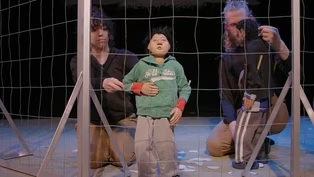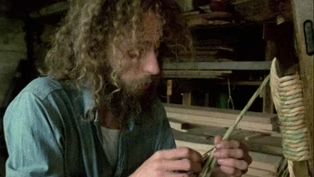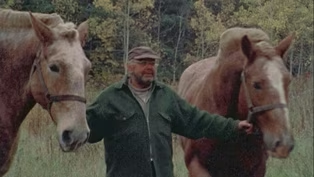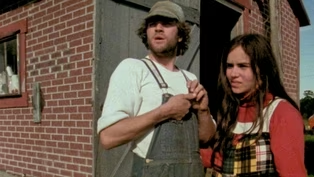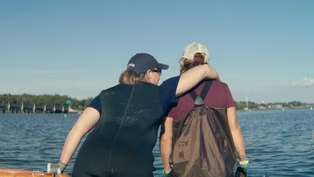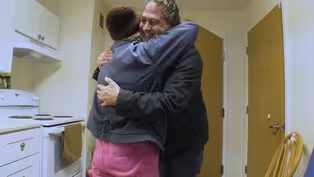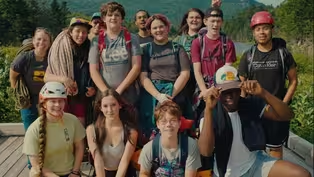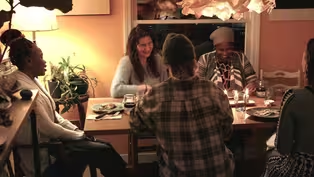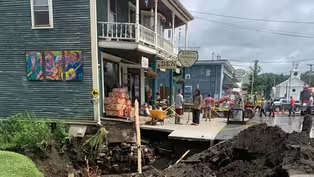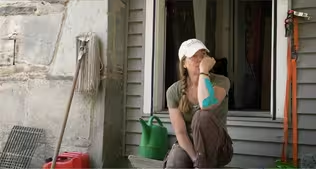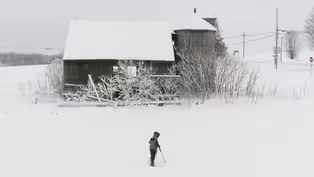Made Here
Breaking Good: Women and the War on Drugs
Season 17 Episode 5 | 53m 24sVideo has Closed Captions
The alarming escalation of the incarceration of women in the U.S. from the war on drugs.
The alarming escalation of the incarceration of women in the U.S. since the war on drugs was declared in the 1980s and how the criminal justice system has unfairly targeted women who have been caught up in the drug trade.
Problems playing video? | Closed Captioning Feedback
Problems playing video? | Closed Captioning Feedback
Made Here is a local public television program presented by Vermont Public
Sponsored in part by the John M. Bissell Foundation, Inc. and the Vermont Arts Council| Learn about the Made Here Fund
Made Here
Breaking Good: Women and the War on Drugs
Season 17 Episode 5 | 53m 24sVideo has Closed Captions
The alarming escalation of the incarceration of women in the U.S. since the war on drugs was declared in the 1980s and how the criminal justice system has unfairly targeted women who have been caught up in the drug trade.
Problems playing video? | Closed Captioning Feedback
How to Watch Made Here
Made Here is available to stream on pbs.org and the free PBS App, available on iPhone, Apple TV, Android TV, Android smartphones, Amazon Fire TV, Amazon Fire Tablet, Roku, Samsung Smart TV, and Vizio.
Providing Support for PBS.org
Learn Moreabout PBS online sponsorshipMore from This Collection
Encounter diverse perspectives on a range of public affairs topics and contemporary social issues.
Video has Closed Captions
Investigating the eastern coyote hunting controversy in Vermont. (38m 6s)
Video has Closed Captions
BABYLON evokes refugee storytelling through puppet, actors and song. (1h 3m)
Video has Closed Captions
Peter Murray (1975) profiles a traditional furniture maker in Charleston, Vermont. (53m 51s)
Vermont People: Chester Grimes
Video has Closed Captions
A 1971 story of a 70-year-old logger in northern Vermont still working with his team of horses. (32m 2s)
Vermont People: Peter and Jane Flint
Video has Closed Captions
A young couple in Wolcott, Vermont in their first year running a small dairy farm. (1h 48m 5s)
Video has Closed Captions
In New Hampshire’s small fishing and aquaculture industries, women have broken down barriers. (45m 31s)
Building Hope: Ending Homelessness
Video has Closed Captions
Puts a face on the unhoused in Maine and tells us it could happen to anyone (57m 43s)
Video has Closed Captions
Teenagers spend a week making friends, rock climbing, and pondering the future in New Hampshire (35m 49s)
Video has Closed Captions
A portrait of a Ghanaian woman as she navigates life in Brattleboro, VT. (37m 33s)
Harry's - One Vermont Community and the Flood of 2023
Video has Closed Captions
Harry's Hardware in Cabot, Vermont and the flood of July 2023. (19m 45s)
Video has Closed Captions
A story of the July 2023 Vermont floods that devastated a street but not the community spirit. (37m 21s)
Vanish - Disappearing Icons of a Rural America
Video has Closed Captions
Vanish chronicles the "visual preservation" adventures of photographer Jim Westphalen. (1h 18m 15s)
Providing Support for PBS.org
Learn Moreabout PBS online sponsorship- [Woman 1] Free her!
- [Protesters] Free them all!
- [Woman 1] Free her!
- [Protesters] Free them all!
- [Woman 1] Free her!
- [Protesters] Free them all!
- [Woman 1] Free her!
- [Protesters] Free them all!
- [Woman 1] Free her!
- [Protesters] Free them all!
- To start, Congress needs not only to act on this national drug strategy, but also to act on our crime package, a package to toughen sentences, beef up law enforcement, and build new prison space for 24,000 inmates.
- This is not an easy fight to fight.
We're about invested in people.
And when it comes to people, we're focused on rehabilitation and giving folks a real second chance because they are coming home.
(protesters yelling) - The states need to match tougher federal laws with tougher laws of their own: stiffer bail, probation, parole, and sentencing.
- Our penal institutions, which we know don't work.
- [Pres.
Bush] Victory will take hard work and time, but together we will win.
- [Protesters] No new prisons, no new jails!
No new prisons, no new jails!
- [Female Protesters] Again, with our sisters and it'll change anything.
(protesters applauding) (protesters cheering) - We are determined that a prison is not built in the Commonwealth.
We have one of the lowest incarceration populations of women in the country.
The last thing that we should be doing is building a $50 million women's prison.
Jail or a prison is no place for a woman to heal and advance her life.
- [Protester 1] Yeah.
(people cheering) - We need to take that 50 million dollars and put that money into our people and into the neighborhoods that are entangled in this criminal legal system.
- [Protester 2] That's right.
(people cheering) - The number of incarcerated women increased from roughly 20,000 people in the 1980s to 200,000 women now in prisons and jails across the country.
There's been about a 700% increase.
It has a lot to do with the growth in prison terms.
So when women are arrested and they're convicted, they're more likely than in the past to get a prison term, compared to a probation sentence, for example.
Also they're increasingly given longer sentences than in the past.
And then the other big factor is the war on drugs.
(protesters yelling) (police sirens blaring) In the period since 2000 until the pandemic, the number of women arrested for drugs increased while the number of drug arrests for men has seen little or no increase.
Women, they're caught up in the system because of their relationship with men who are very active in the drug trade.
And what can happen in some of those situations is that when their partner is arrested, the partner is able to share information with prosecutors and receive a plea deal that takes into consideration the cooperation that they had with law enforcement.
But women sometimes, because their only connection to the drug trade is their partner, they don't have that kind of information to offer prosecutors so that they can get a more advantageous plea deal for themselves.
So sometimes, even though their involvement is much more limited than their male partner, they end up sometimes with a worse outcome in terms of their sentences.
- Our stories are part of a larger picture.
This is why this work is so important.
We made history this year.
We launched our first subsidized housing program that housed 18 formerly incarcerated individuals and provided them housing vouchers to reunite with their families after incarceration.
(people applauding) (fast paced music) Every time my phone rings, it's not good news.
This work is not easy to do, but when you have a chance to reunite a child, a mom, a dad, and put somebody who has been homeless for 10, 20 years, it makes it all worth it.
I grew up in Roxbury, Massachusetts.
I had a nice childhood, actually.
I grew up in a middle class family.
I can't complain.
We had a good upbringing.
I was an honorable student.
I always had good grades, but my conduct was awful.
(laughs) I ended up getting into fights in high school a lot.
And me and my friends would all skip school.
We would go to my house and we would smoke weed and drink.
My first experience with drugs was when I was 13.
And so, you experiment with things.
Your very risky behavior when you're at that age.
- [Woman 2] Be ready.
- [Woman 3] When I count to three, everyone says new beginnings.
- [Man] New beginnings.
- [Crowd] One, two, three, New beginnings!
(people cheering) - This is a long time coming.
When women come back into communities, that they actually have a home to come to, that they have the dignity and peace and love and support they deserve, and that we are taking care of our people in our communities.
And so what we have today with the New Beginnings grand opening is a safe space for people to come to and we all owe our thanks and love and admiration to Miss Stacey Borden!
(people cheering) - [Man] Yeah.
- I'm the 11th child of 12, (gentle music) Seven brothers, five girls.
Growing up was amazing.
It was just magical.
And on the other side, dysfunctional.
My two older brothers were drug addicted and in and out of trouble and police would always come.
And then there was me who was problematic, always, you know, high.
I was 11 when I first started smoking marijuana, and I wanna say 12 or 13 when I first sniffed cocaine.
You know, my brothers were selling it.
It was more like the lifestyle.
I was suffering because there was a teacher and I remember sitting on her lap and I remember something happened and I blacked out.
I cannot recall what happened.
Back in hindsight now I feel like something happened sexually.
I feel like that's where my early childhood trauma come from.
I started being a problematic child.
I was withdrawing.
(lively music) I really couldn't accelerate in school.
I just felt so incompetent and my comprehension level wasn't good.
And so once I got to JP High, it was drugs.
I started popping mescaline and microdots and sniffing Percocet.
All these years later I never knew that I even existed and that's just how my life went.
Not feeling like I even existed, I just floated.
And my senior year, I was sexually assaulted and that took me over the edge.
I didn't know how explain it to anybody.
I didn't know how to explain about the young childhood sexual assault or the young adolescent sexual assault.
I didn't know what mental illness was.
And so I started drugging heavily and it was causing a lot of problems in the household.
And eventually I started running away and staying out and getting myself in trouble until my first incarceration, that was in 1982.
(dramatic music) - [Woman 1] Free them all!
- [Advocate] Right now in the United States, we know that there are over 6,000 women that are serving life sentences.
And so we need to think about for these women, what is the value of keeping them in prison forever?
What's lost in terms of, for their family, for their community, but also what do we lose by incarcerating people at a very high expense as they go into their old age?
- [Patricia] In FY21, the cost per offender in the female facility was about $187,000 a year.
Women have different issues that result in their incarceration.
They've had trauma in their lives that have contributed to their ultimate incarceration.
- Why did I deserve that, right?
And I didn't know how to process it.
- While women are incarcerated, they have a different experience.
- Because when I was in there, I held all that pain in because when you're incarcerated, there's so much drama going on inside the prison that you're just trying to survive in there, right?
- Unfortunately, you know, and it's something I'm working on very hard, resources, rehabilitative resources for the female population have not always been at the top of the page.
And so we're working very hard to change that.
- [Advocate] If the goal is to help a woman end her substance use problem and the consequences that she's imposing on her community because of her substance use problem, and her role in the drug trade, if that's the goal, what else could we be doing to achieve that more effectively?
- The WORTH Program is here to address the needs of one of our most vulnerable populations, young people.
Not just young people, but young women in particular.
WORTH is intended to provide age-appropriate counseling, education programming, and mentorship to reduce recidivism and to give these young women their second chance while they're here so that they can produce a more productive life once they leave this institution.
They have committed crimes and they should be held accountable.
However, these women should not be defined by the mistakes of their past.
Rather, they should be recognized for all of their future potential.
- I'm incarcerated because of a drinking and driving accident.
Me and two other friends spent the day drinking and I ended up driving us home and I crashed.
(police siren blares) And then a few days later, I found out that one of my friends passed away in the car accident.
And I actually found out upon my arrest that I was pregnant.
So I was dealing with a lot of emotional things when I first came in.
I was 23 years old.
- We know that roughly 75% of those incarcerated in the correctional system today did time between the ages of 18 and 25, which is why we need to set offenders in this group on a better path.
- There's a lot of substance abuse related issues with female populations.
Many of them are mothers already and they have parental obligations despite the fact that they're incarcerated.
We wanted to be responsive to that so we needed to create something that was a little bit different from how we treat the male population.
So the WORTH Unit began with my exposure to the European model in 2015.
I was invited to go and look at different facilities around Germany.
We stopped at this one particular facility, it was a co-ed facility, and it was unique in terms of its response to what they refer to as emerging adult populations.
That's people in the age group of 18 to 25.
And the notion that the brain is not fully developed until the age of 25.
It's a very impulsive population, easily-manipulated population.
That made a lot of sense to me.
So one of my goals during my tenure was I wanted to create a healthier environment for the staff and incarcerated populations.
Then we embarked on the WORTH Project, which was unique in its own way because it was very much like, I would characterize it as a therapeutic community.
There's a family engagement piece to that.
- I am able to see my daughter more when I'm in WORTH because we have these special visits twice a month.
They're called family engagements.
I'm allowed to bring things to show my daughter, like if I purchase something she can play with it at visits.
And we can take pictures.
So I have pictures of me and her when she was like two, three months old that otherwise I would never have been able to have.
- And there was a mentorship piece to that, right?
So not only did we train the staff and what we felt their needs were, but we also trained the mentors to work with the mentees who are the emerging adults.
- So a typical mentor, they've been here incarcerated for a while.
So they know how it is in here and how to deal with certain problems.
Because ultimately there are arguments and conflicts and it is a negative place to be.
So over here we sit down and have restorative circles where a staff is involved and mentors, and we sit and we talk out our problems.
- [Scott] And it was a separate unit within the campus of the facility.
We allowed them to bring in blankets from home and it became very communal.
- It's just like a different experience.
You're not locked in your cell.
The staff talked to you like you're a human.
They call you by your first name, ask you how you are, how your family is.
They share stories with you.
They don't just treat you with a number.
- In terms of being able to provide a more humane and dignified approach to how we engage with people in the justice system, I think that we were hitting the mark.
- [Victoria] They actually cared about our wellbeing and wanting us to go home and do good and not come back to jail.
I believe that the whole point of the program is to give people second chances.
- And we really pushed the envelope in terms of being more humane and providing some semblance of dignity to the people that we were overseeing.
And some people would question that like, why would we do something like that and go down that road?
And I gave 'em the short answer.
And the short answer is there's a reason we're called the Department of Correction.
If we're not correcting, we're incapacitating.
(lively music) - The focus for corrections needs to be on actually correcting the behavior and rehabilitating people and not punishing them and breaking them down more.
Their punishment is already being here, away from their families, and it's important for them to work on themselves and change for the better so they can stay out of here.
- If you break the law, despite whether you're a man or a woman, or however you identify, there needs to be some semblance of accountability.
- Most women here have kids and kids need their moms.
And I believe that that should definitely be taken into consideration when a woman gets arrested.
- And I think women should be given some special consideration.
And many of them coming into this system have significant needs.
Whether it's trauma exposure, substance abuse, many women are a single parent raising the family.
And I think all of those factors need to be taken into consideration to be as responsive as we can to those folks.
- I feel like I hit rock bottom.
- My son, I left him when he was three.
When I came home, he was 13.
- [Interviewer] Wow.
- So it really put a strain on a teenager's life, being without his mother for so long.
- Because I lost my kids.
So it's been a tough one.
And- - He also grew up with seeing me inside of a prison.
And it made him angry.
- I get it that we do the crime and whatever, and we have to pay for it.
But at the same time, when you in there and you're not connected with your family, you tend to get very depressed.
It messes you up mentally big time.
(dramatic music) - I had dropped out of college.
I didn't have a job.
I couldn't pay my bills.
I was pregnant.
I didn't know what I was gonna do.
And so I began identity theft and I was very successful at using other people's information and then stealing their money.
And so, I did that for like a year or two and I ended up going to prison.
Today, prisons are 10 times worse than it was back then.
But back then, it was pretty bad.
I had a correctional officer who was bringing drugs into the prison.
And so I was under investigation for having drugs.
They had me in the hole for maybe six months.
If you've never been in solitary confinement before, it can be a traumatic experience.
I would just be in my cell every night, just on my knees, praying, like, "God, please get me outta here.
I'll never come back to prison.
I'll never do this.
I'll never do that."
You know what I mean?
And so when I got out, I wanted better for my children.
They needed their mom and being separated from them was the worst experience of my life.
Nobody could take care of your kids like you do and nobody's gonna love them like you do.
Time away from my children really affected me.
And I vowed never to go back.
- Roughly 58% of women who are incarcerated have a minor child and that child often lives with them.
So that means when a woman is incarcerated, that child has to go with another family member or into foster care.
So that's very disruptive for the family.
- When she first went away, I think it was two years, I was probably six.
And I know how it is to not have a mom for that long a period of time.
Everybody needs their mom.
And I didn't know what to do when she was gone.
She was my mom and dad, basically.
I grew up without a father so she was my father figure too.
And then when she was gone, I had really nobody to talk to.
She always felt guilty because she knew what she was doing was wrong, but she had to put food on the table for us.
So I can't be mad at her for doing what she had to do 'cause we had to survive and that was our key to survive was to, whatever she was doing.
- I was back out there again, selling drugs, just running the streets, just looking for love on the wrong places.
(lively music) That lifestyle brought me right back to drug use.
And then in 1992, the arrests started happening again.
And I just thought that I was helpless.
I was hopeless.
It was just over.
And I went back on the run.
And so from 2002, 2003, I just went crazy.
Stealing, writing checks, creating checks, opening up bank accounts, everything possible that I could do to feed my drug habit.
I just didn't wanna feel anything anymore.
And in 2006, I got arrested.
I knew when I was in Framingham, I had 15 warrants out of Massachusetts, all over, every county.
(mellow music) My change started happening, 2007, I had taken a walk with Angie Jefferson, who's a lifer.
And we walked around that yard, I'm framing here.
She said, "Girl, you better stop coming through here.
You're gonna end up with a life sentence."
And I'm like, "What do you mean life?"
Life?
Now I knew life.
We always knew life.
But when you hear it from someone and you hear it in that type of content, life, you're never coming home?
And then a year went by, 2008 now, there was this Judge Coffey who looked at me and said, "What is wrong with you, Miss Boyden?
You got a drug problem?
How old are you now?
You're still doing this?"
Nobody never asked me what was wrong or what happened to you.
And in that moment, when Judge Coffey asked me that I just started crying and everything came out, the rapes, the drug addiction, the beatings, the not knowing how to tell anybody what happened to me.
And he looked at me, he said, "What do you wanna do?"
"Well, y'all, I wanna go to the CRA."
And he said, "What's the CRA?"
Correctional Recovery Academy run by Spectrum Program.
I see all the women that come out of that program pretty happy.
I need some correction, I need some recovery and I need some education.
I remembered the conversation Angie told me, "Get up there and go to school.
Do something with yourself.
Get in there and try to help other people."
And that's what I did.
(lively music) - I went back to college.
I went to Northeastern and I got my Bachelor's Degree in Management Information Systems.
I graduated Dean's list from Northeastern and I got a job.
I loved it.
I bought my own home and I raised my kids.
And they were doing beautifully.
And then we got budget cuts because the organization was downsizing.
I had to pack up all the computers and I end up injuring myself, while I was on workman's comp, everybody got laid off.
I had a mortgage, (laughs) right?
My daughter was in college by this time.
I can't go back to work because of my injury.
I was getting a prescription for oxycodone.
Somebody asked me to buy some of my prescription pills one day.
And they told me that one of my pills went for $30 and I was astounded like, "Are you kidding me?
That's how much these things cost?"
And they were like, "Yeah, you can get $30 a pill."
And so I did the math.
I had like 80 of 'em and I'm like, "Oh, I could pay my mortgage with this money."
I counterfeited my prescription and ended up having people go into the pharmacies and cashing prescriptions.
And that's how I paid my mortgage and paid my bills.
And that's how I landed in federal prison for a five year sentence for counterfeiting prescriptions and selling oxycodone.
- It's important to think about why we incarcerate women because there's maybe more of a willingness in the general public to think more empathetically about women.
The fact that they're more likely to be taking care of their children when they're released and the collateral consequences of having a criminal record have a broader impact on their families.
And if we're able to realize a woman who sold drugs, a woman who has a drug use problem, a woman who has engaged in burglary or violence, if we can think more compassionately about what drove this woman to that point?
How can we prevent that outcome for other women?
And what does that mean in terms of how much punishment that woman deserves?
- "It is the beginning of repealing, current discriminatory public housing policies in the state."
- Women were saying they felt safer in there than out here, because there was nothing for them out here.
How could there not be anything out here?
And how do you feel safer in prison?
If we don't have any support or resources, how do you expect us to navigate and live a normal, productive life?
And I made my mind up then, that when I got out I was gonna do something different.
And late in that cell, night after night, dreaming of how to create a re-entry program.
And so in 2010, when I left out of that prison, not only did I have the right intentions, those intentions found some meaning and purpose so we never have to go back to prison again.
And then my journey began.
- Now I know it was very harmful.
My whole family suffered.
My children suffered while I was in prison.
I was ashamed of my behavior.
I should have knew better.
My kids were grown and I think that was another reason why it was so easy for me to go back into that lifestyle because I felt like, oh, if anything happened to me, they're grown now.
They can take care of themselves.
It was just foolish for me to have that outlook on things, that it was okay.
I was trying to justify what I was doing.
I had a lot of guilt.
My daughter had to drop out of college 'cause I couldn't pay the tuition anymore.
And my house, right?
It was like, who's gonna take care of my bills now?
And my daughter was able to maintain my mortgage at 18 years old.
Imagine having to drop out at college, find a job.
That's a big responsibility for a kid and she did it.
I heard her grow up over the phone.
She became so mature, more mature than I was at her age.
Even though they were teenagers or young adults, I know that's a vulnerable time.
When you go to prison, you just pray that your kids are gonna be okay, right?
And the worst fear is something happening to them.
And that came true for me.
My daughter was murdered.
- Brianna, yeah, she was, she loved my mom.
So she didn't know what to do.
After my mom left, she was very confused.
- Not having that parent around, and I was very close to my children.
I was a protective mother, a good mother.
And so, for them not to have me to guide them, I just knew that they were gonna have that missing.
- She didn't have the proper guidance after my mom was gone.
So she was running the streets, she was with the wrong crowd and she was just trying to fit in, I would say.
- A lot of mothers get separated from their children.
And just because they go to prison doesn't mean they're not good mothers.
We need to keep women connected with their children.
Because when we go to prison, our families suffer.
Our children feel the separation like we do.
- Mothers know their child very well.
They're our backbones.
They're our guidance.
So I would say it is very important to have your mom in your life.
Whatever your child does or the mother does, that bond was gonna always have to be there.
Always.
- [Leslie] If it wasn't for him I don't know if I would've made it when I came home and didn't think I could go on with life.
- I'm just more connected with her because she was gone for about four years.
- Every day, every day I struggle.
I go to bed crying and I wake up crying every night, but I'm able to get through the day.
He stumbled on some buildings he said, in Brockton.
- And the women who are incarcerated tend to be women who are the head of single-headed households.
So when women go to prison and they have primary caregiving responsibilities, one of the things that happens that is incredibly consequential, not just for the women themselves, but for their families is that- - Just having a criminal record, especially if it's a drug conviction, what that can mean is that in some states you lose your access to cash assistance and food stamps.
And that's very harmful for women's families and women's abilities to provide for their families, especially low-income women that are caught in the system.
That is an impact that's disproportionately felt by low-income women of color because they're the most likely to be reliant on that kind of government services.
(protesters exclaiming) - We wanted to take this moment to stand in solidarity with the women who are caged inside the ACI here at this women's prison.
- [Nazgol] We really need to rethink how often we're arresting and prosecuting and incarcerating women in the first place, because they're more likely to have young people that are dependent on them and their families.
- We are mothers.
We are daughters.
We are sisters.
Free her!
- [Sen. Kallman] There are organizations also like the National Council of Incarcerated and Formerly Incarcerated Women and Girls.
- [Andrea] We are going to end the incarceration of women and girls in the state of Rhode Island.
- Who advocate total prison abolition.
This is an idea I can get behind.
That's why we have this study commission.
So if we were to look at it, the goal is to say, what would it take to get Rhode Island to zero incarceration of women and girls?
- Abolition for all women and girls, I believe that any leader of a correctional entity, part of their job is to put themselves out of business.
The more you can keep people outta the system, the smaller the system is, the more responsive that you can be.
But it's part of a large criminal justice network and really corrections is the back end of that and doesn't get to control what comes into the system.
- I think it's unrealistic because while I totally agree there are people who don't need to come to prison, the reality is that we have a fair number of people here who have committed very violent offenses.
And so, until I hear what the alternative is, total prison abolition doesn't make sense to me.
But just throwing people in jail who have a drug addiction is not smart.
We need to be smarter about it and I think we are.
- [Sen. Kallman] We think of Rhode Island as a national leader in decarceration.
Rhode Island has reduced its prison population by over 30% since it reached its peak level in 2008 without increasing crime rates.
So that's been a very important example for the rest of the country.
(police siren blares) - Not everyone needs to be sent to prison for their misdeeds.
There are other avenues of dealing with some of what causes people to commit crime.
and that was recognized.
So the judiciary, the prosecution, the defense, look at ways to keep people from coming here in the first place.
- I believe that this legislation is fair and I believe that it is just.
- [Reporter] Monday morning, Rhode Island Attorney General Peter Neronha outlined the plan to reclassify simple drug possession under one ounce from a felony to a misdemeanor.
The move would also lower potential prison time for simple drug possession from up to three years to up to one year.
- Along with that initiative was an initiative to provide inmates with the ability to earn time off their sentence, off the incarceration portion of their sentence, by participating in and completing rehabilitative programming.
So that's why I think you see the drop in population without the concurrent rise in crime rate, because people are dealing with the issues that brought them to prison in the first place.
- But I also wanna say that we need to see even more decarceration because a 30% reduction does not end mass incarceration.
We need to go farther.
We need to realize that a lot of people are serving life sentences.
And then another point I would include for Rhode Island is the need to scale back community supervision.
Rhode Island has a very low incarceration rate, in particular, for women.
- [Patricia] There are 83 women incarcerated right now at the adult correctional institutions.
- But it has a relatively high rate of community supervision.
And so that means, these are women that are in regular contact with probation or parole officers, so someone who has the ability to arrest you and incarcerate you if you miss a meeting, if they find drugs in your system.
- And so there's somewhere around 24,000 people who are on probation and community supervision in Rhode Island.
So in another state, you might go to prison for something that you're not gonna go to prison for in Rhode Island, at least your first time out.
But you're gonna be on probation and you're gonna be on probation for a long time.
And there's some of the longest in the country and that's not effective.
We certainly don't have the resources to intensively supervise 24,000 people, nor do all 24,000 of those people need intensive supervision.
It interferes with people's ability to get employment, to leave the state, and so again, as part of a justice reinvestment initiative, and we looked at ways of shortening people's probationary terms.
The justice system in Rhode Island has really come around to the idea that we don't need to keep people on probation for 25 years to be effective.
- [Senator] Welcome to the Special Legislative Commission to Study Justice Reinvestment Proposals and Provide Recommendations for Reducing the Incarceration of Women.
I will turn the screen over to Dr. Ramaswamy.
Thank you for joining us today.
- Thank you so much, Senator, and I appreciate being able to speak to this group.
As many of you know, the United States is the largest incarcerator of women in the world.
And on any given day, there are 1 million women under some type of criminal justice supervision.
It is true that most of those women are under community supervision, parole, probation, but they are still affected by the system and are cycling in and out of jails and prisons in this country from year to year.
With respect to sort of the incarceration of women in this country, I think one of the problems has been a policy problem for the last 40 years around how we criminalize substance use.
And that has been the primary driver of women's incarceration in this country.
- There has been really good bipartisan support for justice reinvestment, I will say that.
And because we are a small community, we can be nimble, we can move quickly on the things that matter.
- Here in Rhode Island, we saw 384 overdose deaths in 2020.
That's one death every single day in the state.
In 2021, we saw 434 overdose deaths, which is the highest ever recorded.
So we have an unprecedented and massive crisis right now where we need more support and resources in order to prevent overdoses and save lives.
But Rhode Island is seen as a leader in addressing the overdose crisis.
This year, we were the first state to authorize harm reduction centers, which are places where people can go to consume pre-obtained substances under supervision.
- You know that Obama/Biden moment where they say this is a big fricking deal?
(laughs) (audience laughs) To pass harm reduction legislation that includes supervised consumption.
That'd be the first in the nation, that's a big fricking deal.
(people applauding) - [Dr. Marshall] We were also the first state to legalize drug checking programs and fentanyl test strip distribution.
- [Man] One solid line would be positive for fentanyl and two solid lines would be negative for fentanyl.
- With regard to female populations and substance abuse issues, many states do some very good work.
Our neighboring state in Rhode Island is well known for the work they do with medication-assisted therapy.
- Hi, welcome to Codac.
- Hi.
- [Codac Worker] Can you please, how you doing today?
- Codac is the oldest, largest, and only non-profit provider of substance use disorder treatment in Rhode Island.
We were actually the national model to provide medication-assisted treatment for opioid use disorder in correctional facilities, meaning prisons or jails.
- The reason we were a trendsetter was because we were the first correctional system to use all three approved medications, methadone, Vivitrol, and Suboxone in the treatment of opioid use disorder.
It's a program that doesn't just involve the medication, but it also has a therapeutic component.
Our provider, Codac, not only administers medication to the inmates, but also they are then enrolled as a Codac patient.
So when they get out, they're already in Codac's system, there are Codac facilities throughout Rhode Island.
They have an appointment with a Codac provider, literally the day after they're released, they can go there and continue the program so there's that continuity when they get out.
- All right, thank you.
- [Codac Worker] And you have a wonderful day.
Thank you.
- [Linda] We began the program in 2015, 2015 is when we started to see fentanyl.
- [Dr. Marshall] Fentanyl is sometimes prescribed to treat severe pain.
It's similar to morphine, but it's up to a hundred times more potent.
- In 2015, over 25% of the individuals who died from opioid overdose had recently been incarcerated and released.
(police siren blares) The deaths themselves occur because even if individuals have had institutional abstinence, if they haven't received treatment, if their brain hasn't changed, then they're still gonna crave just as badly for years when their sentence is finished, but they're not gonna have the same tolerance for the opiate because they haven't used in four years.
And they're coming out to a product that could be 50 to a hundred times more potent than they were used to using before.
That's one of the reasons that the first 48 hours are so critical when someone is released from incarceration.
- [Patricia] Anyone released from incarceration is 120 times more likely to die of an overdose in when they're first released.
That's the most vulnerable time for them.
- So we knew that this was a highly, highly vulnerable population.
(ambulance siren blares) Fentanyl was the primary cause in the deaths that occurred.
Also then, the horrendous proliferation of opioid medications that just became its own black market.
It was huge.
And younger and younger people and populations that would not ordinarily inject drugs because of the fear, perceived risk could take a pill, we're a pill society.
So opioid dependence started to proliferate due to people's lack of understanding of what taking these pills meant.
- Women in particular in the United States experienced a 260% increase in fatal overdose rates from 1999 to 2017.
So that went from about 4,300 fatal overdoses in 1999 to more than 18,020 in 2017.
So it's really significant.
However, those rates aren't experienced equally across populations of women who use drugs.
So racialized women, particularly Black women, Latina women, and Indigenous women are experiencing disproportionately high rates of fatal overdose compared to White women in the United States.
(mellow music) (protesters yelling) And a lot of this is linked to systemic racism and the ways in which women are impacted by the war on drugs.
Women are the fastest-growing population in the US prison system, with more than 60% of women being in prison for nonviolent drug offenses.
But similarly, this also isn't experienced equally across populations of women.
So racialized women are far more likely to be criminalized for drug-related offenses than White women.
And so what this kind of breaks down to is Black women being about two times as likely to be incarcerated, Latina women about 20% more likely, and Indigenous women are incarcerated at six times the rate of White women in the United States.
- And the field hospital in Cranston has COVID 19 patients right now, they have- - So what concerns me is that I think we'll be seeing the effects of the COVID 19 pandemic on the overdose crisis for at least a decade.
You know, issues like housing instability, homelessness, job insecurity are gonna continue to affect all of us and increase overdose risk in dramatic ways.
- It's gut-wrenching.
(mellow music) You know, you can see the impacts of people wanting to reduce their COVID exposure, which means using alone.
And a lot of women do use drugs alone, and it's really kind of intimately linked with risk of violence.
And so a lot of women are working to keep themselves safe, which at the same time can increase risk of fatal overdose.
The key piece to addressing overdose risk right now in Rhode Island are the outreach workers.
They are dealing with dual pandemics.
So a lot of their population that they're working with, they were facing both COVID risks as well as overdose risk.
And so it's these frontline workers who are giving everything they've got to try to keep people engaged in care, to ensure that they're connected to the right resources.
It's been really fundamental.
- Even though the women's population here only represents 5% of our overall prison population they represent, I believe, it's 34% of the individuals in the program here.
In the first six months of the program.
the post-incarceration overdose death rate in Rhode Island went down by 65%.
And that meant an overall decrease in overdose deaths in Rhode Island.
And that's, I think, directly attributable to the program.
- [Sen. Kallman] If we can do forward-thinking opioid treatment program that well inside the prison, we should also be able to do it out in the community where women still have, for instance, access to their children.
- So see you tomorrow.
- All right.
- [Codac Worker] Thank you.
- And I find that Rhode Island is ahead of the curve in a lot of things, you know we just passed a free college bill.
Which, by the way, I think a few years down the line could really help in questions related to incarceration, because this is opportunity that is now available to people free of charge, right?
When you come out of prison and you have earned a degree in there, the chance that you recidivate drops drastically.
If you have a safe place to go home to the chance that you recidivate drops drastically.
(sound bowls ringing) - My vision when I created the organization is not only are we trying to house people, we're trying to heal people.
Healing yourself from the trauma of being homeless, the trauma that you endured during incarceration and use that pain and turn it into purpose.
I didn't know what I was gonna do.
I had turned 50 in prison and I was like, "What am I gonna do at 50 years old?
And you know, I can't go back to IT.
I have to go back to school for that.
I don't wanna do that at 50.
- So I wanna thank, first and foremost, my constituent, I think we have become friends and my colleague in the fight for justice, Leslie Credle.
My hero, y'all.
(audience laughs) - [Leslie] I found my purpose, right?
- She changed her life around.
She's an advocate.
She's staying clean.
She's not getting in trouble with the law.
She got her head on right this time.
This is what she loves to do.
(phone caller chattering) I can see it every day.
(phone caller chattering) She was always on the phone, always on the computer, trying to make it happen.
- [Leslie] I talked to Oli, he's got things covered.
He's making moves behind the scenes for you.
- And I'm proud of that.
- [Man] Own all three of those buildings.
- Yeah, you see how things happen?
That's great.
- Yeah.
- So now I am helping you.
Now you're helping me.
(laughs) People commit crimes because they can't get a job.
We did a survey and we asked them, "What was the number one contributor to your incarceration?
And what was the number one barrier once you were released?"
Housing and employment was the number one.
And the number two.
If we provided that, those women would not go to prison.
(mellow music) - Housing is the bedrock of our security, BIPOC individuals and especially Black and immigrant individuals are still going to experience housing discrimination because it's structurally built into the system.
Some people had their own home to go back to.
You know, that's very rare for our folks, right?
And so disproportionately, Black and Brown people are displaced and forced into untenable, unlivable situations again when they come out.
- The war on the poor, the war on drugs, the war on women, and particularly the war on people of color, have all converged here, right?
So we can solve these problems, but we have to look at the systems in an expansive way, right?
So again, it's not just about the prison.
It's about a living wage.
It's about access to housing.
It's about access to healthcare, all of those things together.
- [Woman 1] Hi!
- [Woman 2] Hi, honey!
- [Stacey] Hi, Senator Eldridge, how you doing?
- What's going on?
- Thank you for coming.
- Of course.
- Thank you.
- So proud of you.
- Thank you.
- Unbelievable.
- Yeah, right?
You gotta see the house.
I put her up, I can't believe it.
- Yeah, look forward to seeing it.
(people chattering) - So hello, everyone.
Thank you for your presence and your support.
The time has come.
- Yes.
- All the way from Framingham State Prison to Cambridge College and everything and everyone in between.
This is the first of its kind.
This is the first re-entry program for women in Boston.
Well, really in Massachusetts.
It's unique, with all the services that we've provided to make sure that the women are having the structure and the services, the resources that they need and deserve.
- My daughter's been gone 15 years, right?
And by the grace of God, she be getting out, hopefully in June.
When your children or your family members are in prison, you're in prison too.
I remember Stacey saying to me, she said all the women when I left and especially Kimya, I'm coming back to get you, but I'm coming back to get you in a different way.
You know?
And here it is.
Here it is.
(audience applauds) New beginning.
She's gonna have a new beginning when she comes out.
- [Man] I have Kimya on the phone right now.
I don't know if y'all wanna- - [Crowd] Yeah!
- [Kimya] Hi everybody.
- [Crowd] Hi!
(crowd applauds) - [Kimya] I'm happy to say thank you to all of those who have been on the forefront of making this New Beginnings re-entry home happen.
So many hands and hearts have been put into this project from family to friends, I love it.
- All right.
(audience applauds) (audience cheers) - First and foremost, Stacey, thank you for being the visionary woman that you are.
Thank you for prioritizing reintegration over reincarceration.
And what I know that I know that I know is that we do not need to invest more in prisons in Massachusetts or anywhere else.
(audience applauds) I know I'm here as a Congresswoman, but first and foremost, I'm here as your sister in this struggle and proud to lock arms with the leaders here today that continue to raise our moral consciousness each and every day.
- There's so much opportunity here for our young women, for women who have been cast aside, who have often been ignored.
They need spaces of healing and places to become whole.
- [Interviewer] How many women will be here?
- 10 women to start, for up to 18 months, and then they have to move on.
And we hope that in 18 months, we're able to help them with their employment, getting housing.
We have one-on-one individual counseling.
We have group therapy, substance abuse therapy.
We have a theater in the basement so they can learn how to articulate their story in the theatrical sense.
We have the federal bank coming in, teaching financial literacy.
We have Boston College we've partnered with for business entrepreneur class.
We have a young woman, Mia, who is a chef who's gonna come in once a week and do prep culinary arts.
So we have a lot of partnerships.
We should be able to come right here and give them some skill sets so we could uplift this community.
This brings value to the community.
Imagine the whole trajectory of change that happens in the community 'cause of formerly incarcerated women.
- I believe the people closest to the pain should be the closest to the power, driving and informing the policy making.
- For a long time.
I didn't have a voice.
For a long time, I was silent.
I was scared.
I was traumatized.
I thought I knew everything.
I didn't know anything.
(audience applauds) Statistics has shown us that providing these resources in a safe place, a place of empathy and compassion, will offer the opportunity to heal from the trauma and achieve greatness, in a safe and nurturing environment.
All of a sudden I had a voice and I needed to learn how to use it.
(audience cheers) And I needed people to believe that this is possible.
As long as we put one foot in front of the other, all things are possible.
(upbeat music) (crowd applauds) - [Robot Voice] This meeting is being recorded.
- I'm so proud of these two.
And thank you very much for your inspiring examples.
Congratulations, Stacey and Leslie.
- I am really honored to be given this Peg Erlanger Award.
She was committed to prisoner's rights and rehabilitation.
If it weren't for women like Peg, we wouldn't be here today.
- It feels good when someone notices your hard work and commitment, especially when the work is so personal.
I knew this was my calling when I was viewed as a second class citizen, right?
Viewed as undeserving of housing and employment.
But housing is a fundamental human right.
Here at Justice for Housing, we fight for that right.
We're so happy to receive this reward and continue the work we do.
- Elected officials, you guys get 'em out.
We'll keep 'em out.
That's what me and Leslie are planning to do.
(mellow music)
Support for PBS provided by:
Made Here is a local public television program presented by Vermont Public
Sponsored in part by the John M. Bissell Foundation, Inc. and the Vermont Arts Council| Learn about the Made Here Fund

